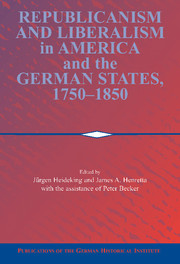Book contents
- Frontmatter
- Introduction
- PART I OVERVIEW
- PART II THE REPUBLICAN WORLD
- 2 The Concept of the Republic in Eighteenth-Century German Thought
- 3 Kant’s Republicanism and Its Echoes
- 4 Constitutions, Charity, and Liberalism by Default: Germany and the Anglo-American Tradition
- 5 Politics and Sentiment: Catharine Macaulay’s Republicanism
- 6 Between Liberalism and Republicanism: “Manners” in the Political Thought of Mercy Otis Warren
- PART III THE TRANSITION FROM REPUBLICANISM TO LIBERALISM
- PART IV THE LOGIC OF LIBERALISM
- Index
4 - Constitutions, Charity, and Liberalism by Default: Germany and the Anglo-American Tradition
Published online by Cambridge University Press: 05 January 2013
- Frontmatter
- Introduction
- PART I OVERVIEW
- PART II THE REPUBLICAN WORLD
- 2 The Concept of the Republic in Eighteenth-Century German Thought
- 3 Kant’s Republicanism and Its Echoes
- 4 Constitutions, Charity, and Liberalism by Default: Germany and the Anglo-American Tradition
- 5 Politics and Sentiment: Catharine Macaulay’s Republicanism
- 6 Between Liberalism and Republicanism: “Manners” in the Political Thought of Mercy Otis Warren
- PART III THE TRANSITION FROM REPUBLICANISM TO LIBERALISM
- PART IV THE LOGIC OF LIBERALISM
- Index
Summary
For English-speakers, ”Germany” signals many impressions of political and constitutional history, primarily of a “statist” tradition, easily contrasted with the “liberal” heritage of Britain, France, and North America. Eighteenth century attempts by Prussia to consolidate central state power at first seem the logical first step in tracing the later, more troublesome German Sonderweg in political and constitutional thought. Yet resistance to centralized remedies intended to alleviate poverty and promote order in state and society - even if not recognizably “liberal” - continued during the eighteenth century in territories of the Holy Roman Empire, even against Prussian overlords. A distinct American tradition of state formation that began with the written state constitutions crystallized in the 1790s. North Americans diverged from European definitions of the state's “police power,” as they contemplated how republics might be called upon to relieve poverty and encourage charity in a virtuous social order.
Before the 1790s, despite obvious differences that marked highly developed European from relatively young North American societies and populations, theologians and politicians on both sides of the Atlantic had concurred that the “police” role of the state applied to charity when authorities had to contemplate good order threatened by “outsiders.” Otherwise, local secular and church authorities and institutions were deemed competent to manage the Christian obligation to care for the poor. This belief revealed itself in legal and constitutional mechanisms in Great Britain and in the Holy Roman Empire’s varying territories. In North America a strong localist tradition rooted in English precedents shaped this conviction as well, despite regional variations that incorporated the experiences of continental immigrants.
- Type
- Chapter
- Information
- Publisher: Cambridge University PressPrint publication year: 2002



